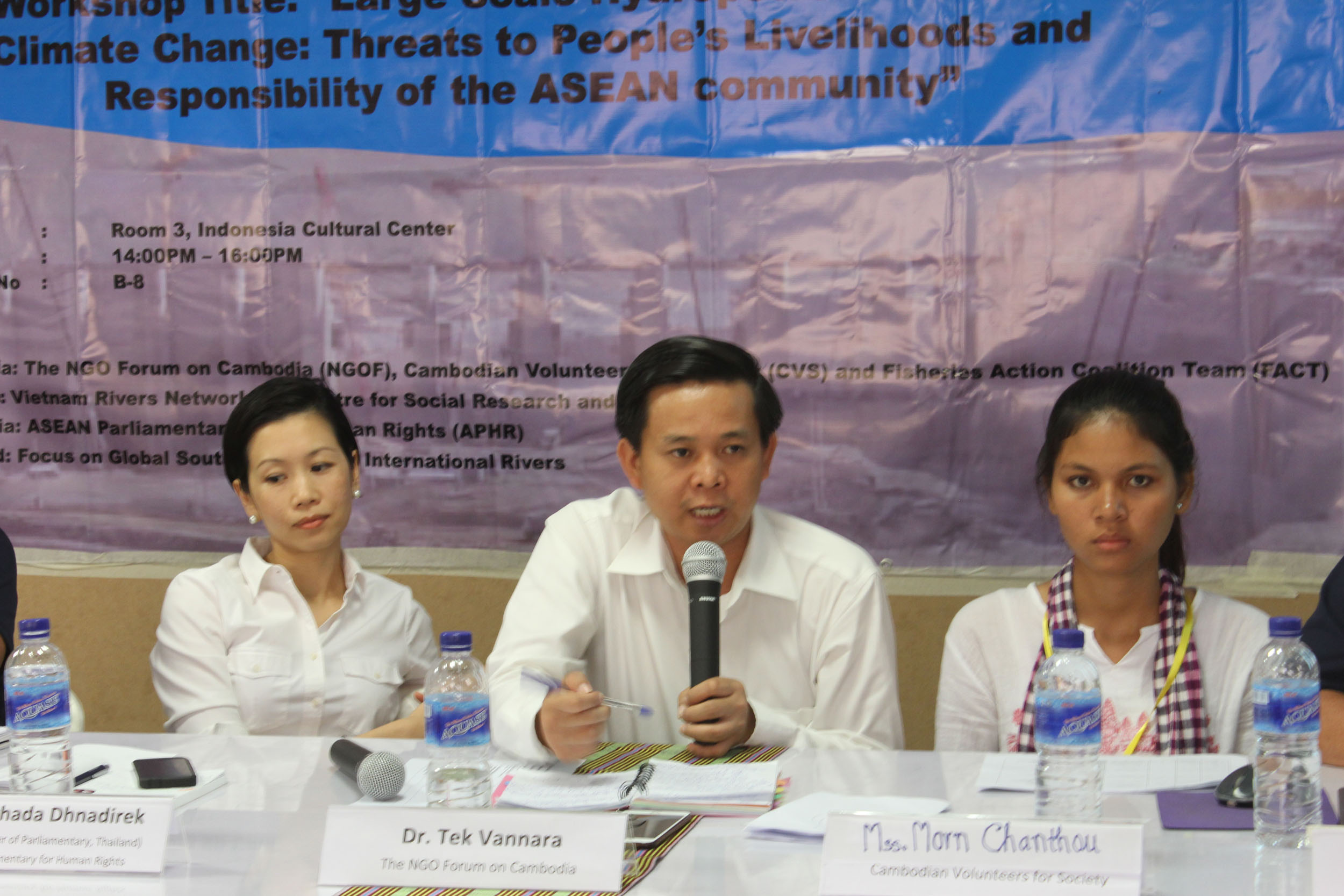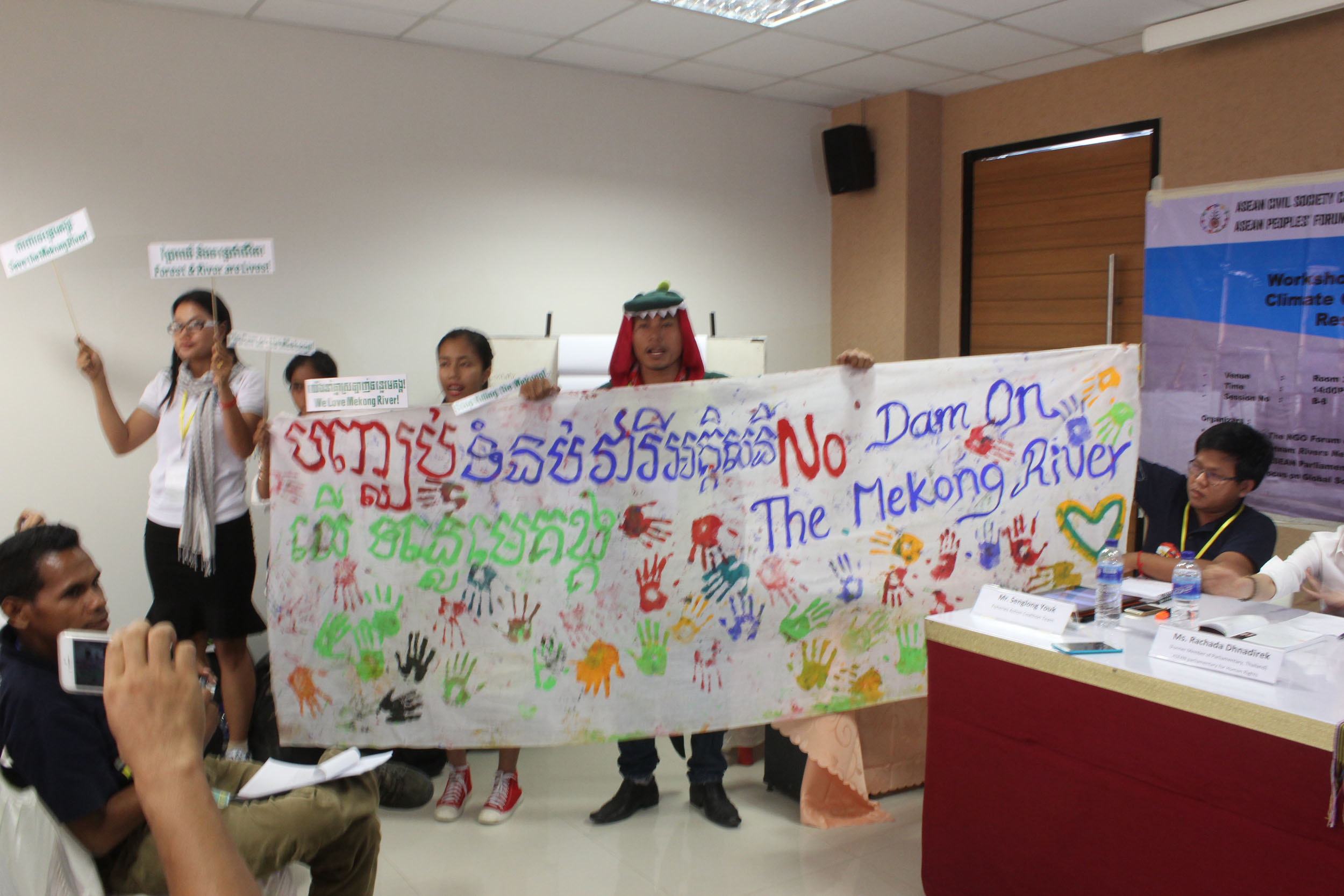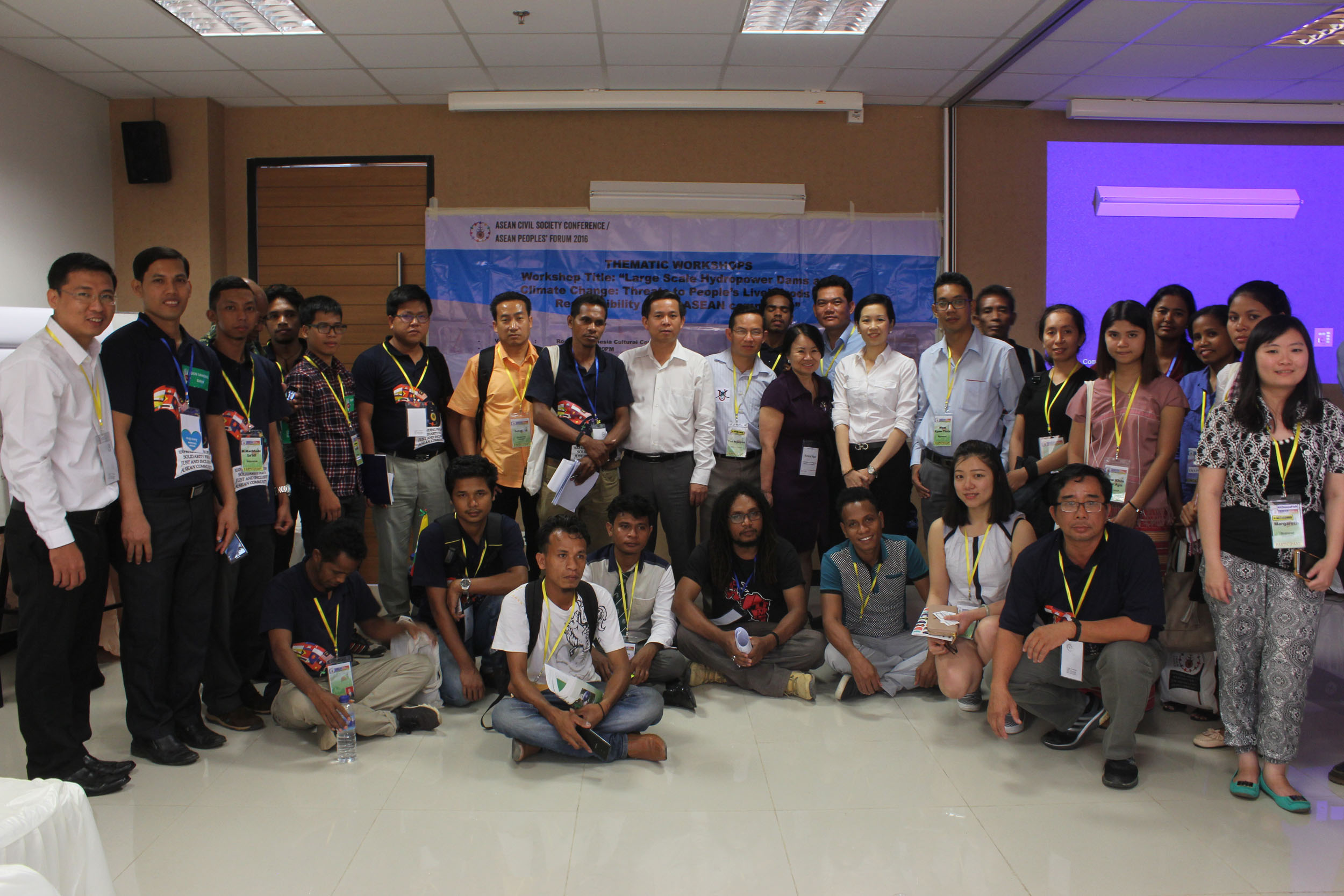
Room3, Indonesia Culture Center, Dili, Timor- Leste on 04 Aug 2016: A thematic workshop on “Large Scale Hydropower Dams and Climate Change: Threats to People’s Livelihoods and Responsibility of the ASEAN Community” was organized on August 4, 2016 at Timor – Leste through a platform of ASEAN Civil Society Conference / ASEAN People’s Forum 2016. The workshop was hosted and co-organized by the NGO Forum on Cambodia (NGOF), Cambodian Volunteers for Society (CVS) and Fisheries Action Coalition Team (FACT) from Cambodia, Vietnam Rivers Network (VRN) and Centre for Social Research and Development from Vietnam, ASEAN Parliamentarians for Human Rights (APHR) from Indonesia and Focus on Global South, TERRA and International Rivers (IR) from Thailand. There are 62 delegates (21 women) from civil society organizations in ASEAN countries and development partners from other countries were participated. the main objective of the workshop were focused on: 1) to raise awareness and share information learned on transboundary issues such as the case studies of hydropower dams on the Mekong mainstream and tributaries, including Don Sahong, Xayaburi in Laos and Lower Sesan 2 in Cambodia 2) to strengthen existing networks of committed organizations in the region who work on hydropower dams issues by sharing common concerns and strategies on dam campaigns and 3) to provide recommendations on hydropower dams on the Mekong Mainstream and its tributaries to be integrated into the recommendation of ASEAN Peoples’ Forum to ASEAN community.

Dr. Tek Vannara, Executive Director of The NGO Forum on Cambodia, was took a role moderator of the workshop. He introduced speakers and objectives of this parallel workshop. The presentation of guest speakers were allocated 10 minutes per each. He also presented legal frameworks and experiences of Water Governance in related Mekong Mainstreaming. There were five key legal principles essential to providing the necessary legal framework which focused on: Public participation, Access to Information, Environmental and Social Impact Assessment, Avoiding or mitigating environmental impacts and Forced resettlement and fair compensation. Significantly, to strengthen existing mechanisms of MRC Agreement 1995 and Review of MRC’s Procedures for Notification, Prior Consultation and Agreement (PNPCA) and other new Proposed UN convention on water focusing on International Water Law and Regional Water Cooperation.
Dr. Le Anh Tuan, water expert from Vietnam Rivers Networks, presented the result of Mekong Delta Study: Water Security and Challenges on Drought and Salt Water in downstream of Mekong River. He presented a brief results of finding the Mekong Delta is receiving more than 85% of water volumes from the mainstream of the Mekong River before running out to both the Sea and the Gulf of Thailand. The Delta supplies more than 53% of the nation’s staple rice and crop food, 80% of the total fish production, and 75% of fruits for domestic and export. It have more serious threats or double impacts – climate change if upstream dams as consequence. In combination, projected climate, industrial development, and upstream dams operation could increase many negative effects on local rice and fish cultivation in the Delta. Lower flows to the Mekong River did not only provide necessary freshwater and alluvium the Delta’s ecosystem and agricultural production, but also let higher sea tides bringing more saline intrusion up 50 to 80 km into cultivated inland. If these hydrologic variabilities combined with other human water extraction and hydropower dam development factors, the MD’s water challenges may become worsen in the future. For a long term strategy for water security in the MD, there is an urgent need for an inclusive and stakeholders participatory approach in the water resource planning and management. Carefulness is necessary in every phase of water project development with regard to social and environmental outcomes (see annex 2).
Upstream dams will be seriously impacts to Tonle Sap great lack in Cambodia, said Mr. Senglong Youk who works for FACT in Cambodia. It is the largest fresh water in Southeast Asia. The great lack is served over 300 fish species, 100 variety of bird species and fed more than 3 million peoples directly. For example, Don Sahong dam has been constructed around 30%. It is closely with Cambodia border about 1.5 km. According the study, the dam will impacts 100 fish species, 40% – 70% region’s meat animal protein from inland fisheries (increase to 80%), RAMSAR Wetland site (Laos Gov’t, 1999), Irrawaddy Dolphin, 60million Mekong people, flooded forests in Tonle Sap Great Lake, water flow, fish migration, sedimentation…etc. (See annex 3).
Youth’s standing position campaign for stop hydropower dams which declared a clear message “No Hydropower Dam in Mekong Mainstreaming”. Governments in ASEAN region to consider on alternative energy sources which promote clear energy generation from solar, wind, bio-gas, bio-mass and mini hydropower, said Mss. Morn Chanda, Cambodian Volunteers for Society (CVS), Cambodia. She also suggests to strengthen capacity and promote youth participations in Mekong water governance (see annex 4).
Last guest speaker Ms. Rachada Dhnadirek, a member of ASEAN Parliamentarian for Human Rights from Thailand, presented about Human rights perspective and Experiences on hydropower dam development along the Mekong mainstream and tributaries. She noticed that there are many impact from development projects, especially hydropower dams as traditional. Regional solutions are critical to address these impacts, but ASEAN lacks strong relevant mechanisms. Therefore, the of APHR work through public and private advocacy to promote the establishment of more robust regional human rights mechanisms (see annex 5).
Plenary discussion:
The moderator has sum up and highlighted the key points from each speaker to refresh more to participants. It was a time for plenary discussion, sharing, and recommendation. There are many participants has raised up their hand for sharing, clarification, recommendations, but as the time is constraints and limited, we have provided only 6 people to be dialogue with guest speakers. Participants have raised up with difference perspective:
– Most of them raised up on affected from dam construction, in particular one participant from Malaysia, he has shared himself is one affected by dam construction in homeland. The compensation from project is one hectare of land per family and now for next generation is no land. That why the people there were left from home to find the job outside for their live.
– But 2 people from Lao in among six people above, they raised that how can people in Lao around 6 million can live if they no money earns from dam construction, Coz in now, Lao people and Government is depended on selling out the power to neighbor countries as such Thailand, Vietnam…etc.
Key responses/note from speakers:
– Yes, we all know that the economic development is very important of each country but we must be carefully, how the economic development is not affected to people, said Ms. Rachada Dhnadirek, a member of ASEAN Parliamentarian for Human Rights from Thailand. One more thing, the money for investment is not wrong but how the investor can use this money with people harmonization;
– The APHR can engage with the AICHR for raising up to their own Government on any issues and problem happened in ASEAN countries. But it would be fine, the affected people should use existing mechanism such national committee on human rights and other line ministries.
– Yes, the hydropower dam is necessary for each country but dam can be disaster for people who are living at down-stream, said Mr. Mr. Senglong Youk who works for FACT in Cambodia. And when we block the river at dam side, the bio-diversity and other natural resources were destroyed.
Workshop’s recommendation:
– Please keep free flow of the Mekong River;
– Please promote revenue energy within the Mekong region;
– Please encourage to the Mekong Governments to ratify the UN convention on Water.
